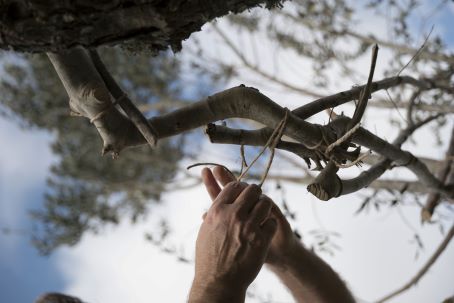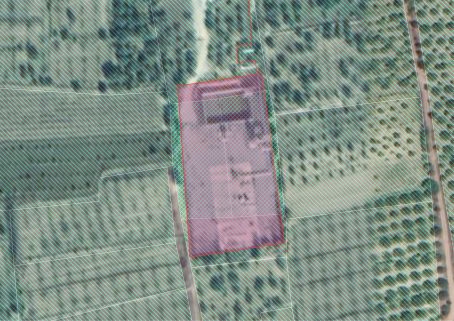Cultural and Artistic Narratives on Inhabiting Environmental Disaster
- Start Page
- Calendar
- Cultural and Artistic Narratives on Inhabiting Environmental Disaster
Cultural and Artistic Narratives on Inhabiting Environmental Disaster

Luigi Coppola, Vinculum, living sculpture. Foto: Alessia Rollo, Lecce (Italy) 2021.
Welcome to this online seminar that invites artists, thinkers and curators from different contexts to reflect on the mediated relationship between culture and ecology. Drawing upon the cases of three different regions Katanga in The Democratic Republic of the Congo, south eastern Turkey and the southern Italy – the invited guests discuss the role of art and cultural production in territories where land exploitation, monoculture and industrial overproduction create environmental disaster.
How to imagine a world-ethic that is socially and ecologically desirable with a view to the notion of the world’s end? How to retrace the trajectories of chains of responsibility in the Western countries? How to imagine alliances that rethink agroecology practices as communal preservation and care? And how to consider a different temporality that interrupts short-term visions to change our imagined futures?
Starting from these questions, the webinar will be opened with a lecture by Marco Armiero Director of Environmental Humanities Laboratory (Royal Institute of Technology, Stockholm), continues with a video intervention from Atelier Picha from Lubumbashi introduced by Lucrezia Cippitelli (curator of Lumbumbashi Biennale) and concludes with a conversation between 2022 IASPIS grant holders Luigi Coppola and Asli Uludag.
Combining contemporary artistic imagination with new action strategies the webinar discusses the role of art practices promoting social transformation.
The webinar is conceived by IASPIS, in collaboration with Royal Institute of Art Stockholm in the framework “Ex Situ” a project by artist Luigi Coppola curated by Lucrezia Cippitelli (Artistic Director of Ateliers Picha and curator of the 7th Lumbumbashi Biennale) and Ramdom (Italy) for the 7th Lumbumbashi Biennale in the Democratic Republic of Congo, entitled Toxicity. The project is supported by the Italian Council (10th Edition, 2021), a program promoting Italian contemporary art in the world by the Directorate-General for Contemporary Creativity of the Italian Ministry of Culture.

Asli Uludag, Plots of Friction 120/123, 2020.
Program
15.00
Valerio Del Baglivo
Welcome and introduction
15.15
Marco Armiero
Wasteocene landscapes, commoning stories. From wasting relationships to commoning practices
16.00
Lucrezia Cippitelli
The Symbiotic Planet
16.15
Atelier Picha, Lubumbashi Biennale
(video)
16.30
Luigi Coppola and Asli Uludag in conversation
17.15
Q&A
Join Zoom Meeting: https://us02web.zoom.us/j/5068225476?pwd=UGdyNjk2WStINWg3MWViZThnUHRCZz09
Meeting ID: 506 822 5476
Passcode: 666
Participants
Marco Armiero is an environmental historian (with a PhD in Economic History), currently working as the Director of the KTH (Royal Institute of Technology) Environmental Humanities Laboratory in Stockholm. He is also a Senior Researcher at the National Research Council, Italy. His main topics of study are environmental conflicts, uses of natural resources, politicization of nature and landscape, and the environmental effects of mass migrations. In English, he has published the books Wastocene, 2021 and A Rugged Nation. Mountains and the Making of Modern Italy (2011). He has also published several articles and special issues in Environment and History, Left History, Radical History Review, and Capitalism Nature Socialism. He has also edited with Marcus Hall Nature and History in Modern Italy and with Lise Sedrez Environmentalism. Local Struggles, Global Histories, and Views from the South. He has been post-doctoral fellow and visiting scholar at Yale University, UC Berkeley, Stanford, the Autonomous University in Barcelona, and the Center for Social Sciences at the University of Coimbra, Portugal.
Lucrezia Cippitelli, PhD, is professor of Aesthetics at Brera Academy of Fine Arts (Milan), co-director of Arthub (arthubasia.org) and the artistic director of Ateliers Picha, the educational program of Picha – Biennial of Lubumbashi (Lubumbashi, Congo RDC). Her research focuses on theories from global south, decolonial theories, art and civic participation. She curated Civic Media Art for cheFare (2017-18) and co-curated the Bienniale Interactiva de Merida, Mexico (2005 and 2007), the Biennale Desde Aqui of Bucaramanga, Colombia (2015), Urban Scenos Dakar / Ouakam (2012-2013). In 2005 she set up a media center in Havana, Cuba (Alamar Express Lab, 2005-2007), and a social innovation laboratory through the arts in Khartoum, Sudan (Khartoum Lab, 2012-2013).
Luigi Coppola is an artist and promoter of participative projects and politically-motivated actions working between Belgium and Italy. Luigi is one of the activator of Casa delle Agriculture (house of cultures and agricultures), a project in Castiglione d’Otranto, south Italy, which seeks to revive abandoned land, repopulate the countryside, generate a sustainable economy and strengthen community cohesion. He has developed projects, performances, installations and exhibitions in international contexts, including at: 5th Istanbul Design Biennale, 2020; Gardentopia, Matera European Capital of Culture, 2019; Fondazione Merz Turin, 2018; BAK Utrecht, 2018; Kunsthaus Graz, 2017; Quadriennale Roma, 2017; Kumu Art Museum, Tallinn, 2017; Teatro Continuo, Milan, 2016; Parckdesign, Brussels, 2016; Athens Biennale, Athens, 2015; Kadist Art Foundation, Paris, 2012; Steirischer Herbst, Graz, 2012 and Democracy Biennale, Turin, 2009. Luigi was joint Artistic Director with Michelangelo Pistoletto of the Urban Art Biennale in Bordeaux – Evento 2011, art for an urban re-evolution, and part of the research group Art in Society at the Fontys Academy of Tilburg, Netherlands. In 2017/2018 he was a fellow at BAK, basis voor actuele kunst, Utrecht, NL, and is currently senior researcher at the Center for Arts Design and Social Science of Boston (US).
Aslı Uludağ is an artist and researcher based in Istanbul. She explores the techno-scientific, legal, and infrastructural instruments of sustainability and the imagined pasts and futures they realize. Her current research investigates the development of geothermal energy in the Buyuk Menderes Graben in Turkey and its effects on the environment and the local communities. She approaches manifestations of toxicity—particularly the sensorial changes in the environment, felt and documented by the local communities—as the product of the unnegotiated folding of the deep subsurface onto the surface by geothermal energy companies. Aslı Uludağ holds a BFA from School of the Art Institute of Chicago (2013); and an MA in Research Architecture from Goldsmiths University, London (2019). She was a participant of the Arter Research Program, Istanbul (2020-2021); and Istanbul Biennial Study and Research Program, Istanbul (2021) Her work has been presented at The Ukrainian Institute of Modern Art, Chicago (2017); Pera Museum, Istanbul (2018); and 5th Istanbul Design Biennial, Istanbul (2020). She is a member of Practices of Attunement (2020-ongoing).
Program
Kl 15.00
Valerio Del Baglivo
Välkomsthälsning och introduktion
Kl 15.15
Marco Armiero
Wasteocene landscapes, commoning stories. From wasting relationships to commoning practices (Avfallocena landskap, gemenskapsberättelser. Från avfallsrelationer till gemenskapspraktiker).
Kl 16.00
Lucrezia Cippitelli
The Symbiotic Planet (Den symbiotiska planeten)
Kl 16.15
Atelier Picha, Lubumbashi-biennalen
(video)
Kl 16.30
Ett samtal mellan Luigi Coppola och Asli Uludag
Kl 17.15
Frågestund
Join Zoom Meeting on this link
Meeting ID: 506 822 5476
Passcode: 666

